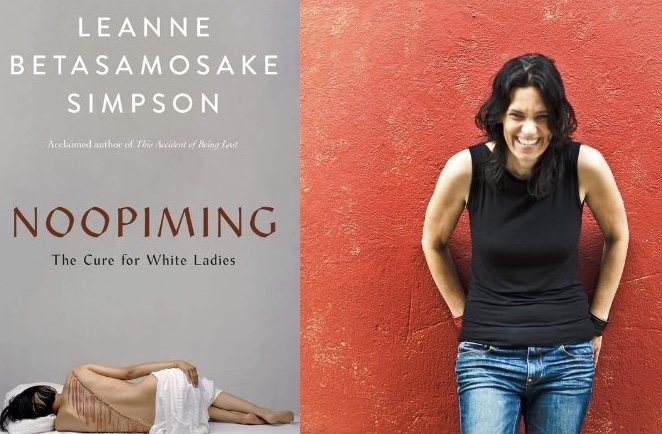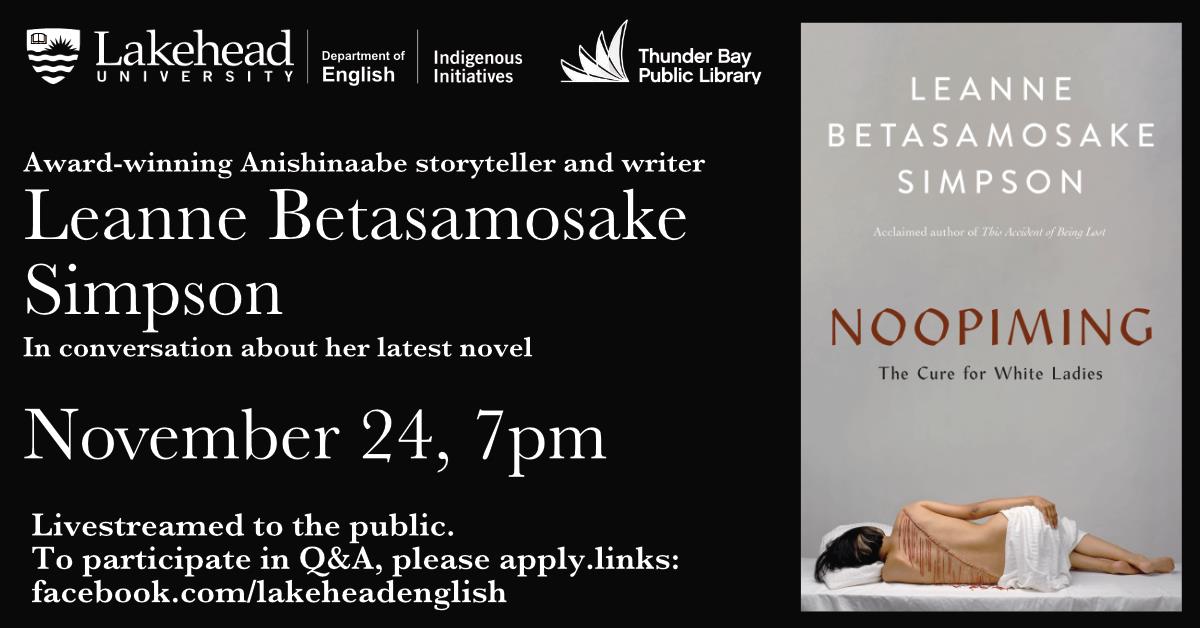Reading and Conversation with Anishinaabe storyteller and writer Leanne Betasamosake Simpson

Event Date:
Tuesday, November 24, 2020 - 7:00pm EST
Event Location:
On-line
Please join us on Tuesday, November 24 at 7pm for a reading and conversation with award-winning Anishinaabe storyteller and writer Leanne Betasamosake Simpson, presented by Lakehead University’s Department of English with the support of the University’s Office of Indigenous Initiatives and the Thunder Bay Public Library.
Facebook event link:
https://www.facebook.com/events/982367982267967/
https://www.facebook.com/events/982367982267967/
Simpson will be presenting her latest book Noopiming: The Cure for White Ladies, available September 1 from Anansi. It can be purchased in paperback and ebook formats here: https://houseofanansi.com/products/noopiming
This is an online event, open to the public around the world and can be livestreamed and watched in the future on the English Department’s YouTube channel here: http://tiny.cc/LakeheadEnglish
Limited spaces are available on November 24 to join the live Q&A with Simpson. If you would like to apply to join the Q&A, please register at this link by November 14, 2020: https://forms.gle/npQi7wP7GuSzu6r67
ABOUT THE AUTHOR
Leanne Betasamosake Simpson is a Michi Saagiig Nishnaabeg writer, scholar, and musician, and a member of Alderville First Nation. She is the author of five previous books, including This Accident of Being Lost, which won the MacEwan Book of the Year and the Peterborough Arts Award for Outstanding Achievement by an Indigenous Author; was a finalist for the Rogers Writers’ Trust Fiction Prize and the Trillium Book Award; was longlisted for CBC Canada Reads; and was named a best book of the year by the Globe and Mail, National Post, and Quill & Quire. She has released two albums, including f(l)ight, which is a companion piece to This Accident of Being Lost.
ABOUT THE BOOK (from the publisher)
Award-winning Nishnaabeg storyteller and writer Leanne Betasamosake Simpson returns with a bold reimagination of the novel, one that combines narrative and poetic fragments through a careful and fierce reclamation of Anishinaabe aesthetics.
Mashkawaji (they/them) lies frozen in the ice, remembering a long-ago time of hopeless connection and now finding freedom and solace in isolated suspension. They introduce us to the seven main characters: Akiwenzii, the old man who represents the narrator’s will; Ninaatig, the maple tree who represents their lungs; Mindimooyenh, the old woman who represents their conscience; Sabe, the giant who represents their marrow; Adik, the caribou who represents their nervous system; Asin, the human who represents their eyes and ears; and Lucy, the human who represents their brain. Each attempts to commune with the unnatural urban-settler world, a world of SpongeBob Band-Aids, Ziploc baggies, Fjällräven Kånken backpacks, and coffee mugs emblazoned with institutional logos. And each searches out the natural world, only to discover those pockets that still exist are owned, contained, counted, and consumed. Cut off from nature, the characters are cut off from their natural selves.
Noopiming is Anishinaabemowin for “in the bush,” and the title is a response to English Canadian settler and author Susanna Moodie’s 1852 memoir Roughing It in the Bush. To read Simpson’s work is an act of decolonization, degentrification, and willful resistance to the perpetuation and dissemination of centuries-old colonial myth-making. It is a lived experience. It is a breaking open of the self to a world alive with people, animals, ancestors, and spirits, who are all busy with the daily labours of healing — healing not only themselves, but their individual pieces of the network, of the web that connects them all together. Enter and be changed.


